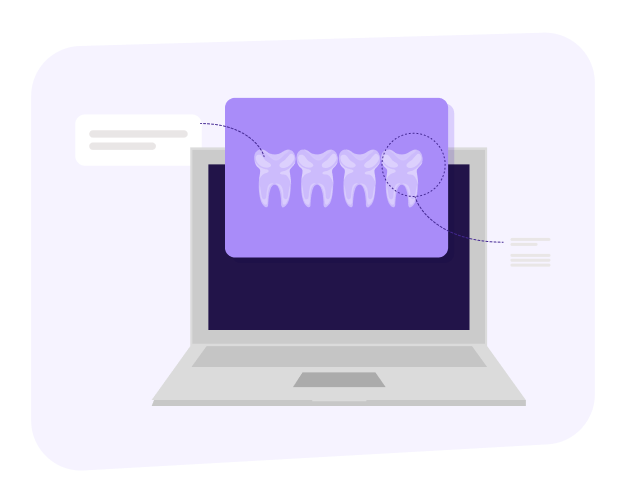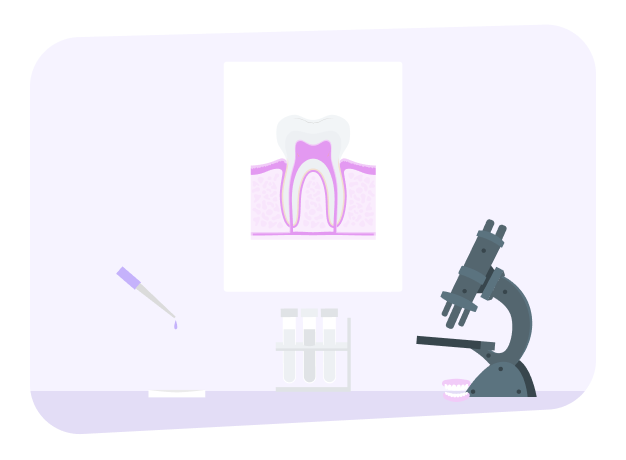The dental industry's journey from its traditional roots has been nothing short of remarkable. Let’s explore:

The field of dentistry is undergoing a remarkable transformation with the advent of digital technologies. Digital dentistry encompasses a range of advancements that are revolutionizing how dental professionals diagnose and treat patients. Key among these advancements are digital impressions, 3D imaging, and computer-aided design (CAD), which have become integral to diagnostics and treatment planning.
Digital impressions have replaced traditional putty-based impressions with a more accurate and comfortable alternative. By using intraoral scanners to capture detailed images of the teeth and gums, dental professionals can create precise virtual models that can be used for various purposes, such as orthodontic treatment planning or fabrication of restorations.
3D imaging has emerged as a powerful tool in dentistry. Cone beam computed tomography (CBCT) scans provide detailed three-dimensional images of the oral structures, allowing for more accurate diagnoses and treatment planning. This technology is particularly useful in implantology, where it enables precise placement of dental implants.
Then, there is computer-aided design (CAD), which has transformed how dental restorations are created. Dental professionals can design and fabricate crowns, bridges, and other prosthetic devices with CAD software and milling machines with unparalleled precision. This improves the fit and aesthetics of the restorations and reduces turnaround time for patients.
Adopting these digital technologies in dentistry holds immense potential for improving patient outcomes and enhancing the overall dental experience. Leveraging these advancements in diagnostics and treatment planning processes, dental professionals can deliver more accurate diagnoses and personalized treatments tailored to individual patients' needs while minimizing discomfort during procedures.
It’s clear that digital technologies will continue to play a pivotal role in shaping the industry. Dental practices that embrace these advancements will be at the forefront of providing high-quality, efficient, and patient-centric care and secure stability as we move into the future.
A fascinating development that is gaining traction is tele-dentistry. This concept takes inspiration from telemedicine and applies it to dentistry, allowing for remote consultations and follow-ups. The implications of tele-dentistry are far-reaching, not only enhancing accessibility for patients in remote areas but also facilitating timely advice and preventive care.
Tele-dentistry bridges the gap between patients and dental professionals who may be geographically dispersed. Through virtual consultations, individuals can seek expert advice without physical travel, saving time and resources. This is extremely beneficial for those residing in underserved areas where access to specialized dental care is often limited.
Dental professionals can now provide timely advice and preventive care via tele-dentistry. Leveraging video conferencing and digital imaging technology, we can remotely assess oral health conditions, offer guidance on oral hygiene and treatment practices, and monitor progress. This is a highly proactive approach that empowers patients to take control of their oral health while minimizing the risk and potential complications.
Patients with busy schedules or mobility limitations can now easily connect with their dentists from the comfort of their own homes or workplaces. As we know, flexibility promotes regular check-ups and early intervention when necessary, ultimately contributing to improved overall oral health outcomes.
As digital dentistry continues to evolve, tele-dentistry stands out as a promising advancement that enhances accessibility, provides timely advice, and promotes preventive care.

Advances in biotechnology have paved the way for groundbreaking techniques in regenerative dentistry. Stem cell research, for instance, has shown promising results in harnessing the regenerative potential of these cells to restore damaged dental tissues. By utilizing stem cells derived from various sources, such as dental pulp or bone marrow, researchers are exploring their ability to regenerate teeth and gums.
Tissue engineering is another exciting area within regenerative dentistry that utilizes biotechnology. Scientists have been developing sophisticated biomaterials that can serve as scaffolds to support tissue growth and regeneration. These biomaterials mimic the natural environment of dental tissues, providing a framework for cells to proliferate and differentiate into functional tooth structures.
The integration of biotechnology into regenerative dentistry holds immense potential for patients who have suffered from tooth loss or gum disease. Instead of relying solely on traditional restorative methods like implants or dentures, this emerging field offers a more holistic approach by stimulating the body's natural healing processes.
While there is still much research to be done, the progress made thus far in biotechnology and regenerative dentistry is undeniably promising. As technology advances, we can anticipate further breakthroughs that will revolutionize dental care and provide patients with more effective treatment options for repairing and regenerating damaged oral tissues.
In the realm of oral health, precision medicine is paving the way for a new era of treatment plans. We are now harnessing the power of an individual's genetic makeup and oral microbiome data. Dentistry is embracing a more personalized and targeted approach to care.
Precision medicine in oral health considers the unique genetic variations that influence an individual's susceptibility to certain dental conditions or diseases. By analyzing this genetic information, dentists can tailor treatment plans to each patient's needs, optimizing outcomes and minimizing potential risks.
Let’s not forget that we are now also considering the intricate relationship between an individual's oral microbiome and overall oral health. The oral microbiome refers to the diverse community of microorganisms that reside in our mouths. Dentists can gain valuable insights into how specific microbial compositions may contribute to various dental conditions by studying this complex ecosystem.
As we combine genetic analysis with oral microbiome data, precision medicine enables dentists to develop targeted interventions that address the root causes of dental issues rather than just treating symptoms. This approach enhances treatment efficacy and promotes long-term oral health and disease prevention.
Precision medicine will continue to advance in the field of oral health, and we can expect to deliver more personalized treatment plans tailored to each patient's unique genetic profile and microbial composition. This transformative shift holds immense promise for improving outcomes and revolutionizing traditional approaches to dental care.

You didn’t think we were going to get through this without talking about AI, did you?
The integration of AI into dental diagnostics is absolutely revolutionizing the field by improving the accuracy and efficiency of identifying oral health issues. With the help of advanced AI algorithms, dental professionals are now analyzing dental images with greater precision, detecting abnormalities, and aiding in the early diagnosis of conditions such as cavities and periodontal disease.
Dentists can rely on more objective and consistent analysis of dental images, nearly eliminating human error and ensuring a higher level of accuracy in diagnosing oral health problems, saving valuable time and allowing for prompt treatment planning and intervention.
AI is helping us identify subtle signs or patterns that may go unnoticed by human observation alone. We are allowing machines to evaluate vast amounts of data from various sources to recognize even the most minute indicators of potential issues, enabling early detection and prevention and restorative practices to begin as early as possible.
The integration of AI in diagnostics has the potential to enhance patient care by providing dentists with comprehensive insights into a patient's oral health history. Analyzing previous records alongside current diagnostic data, AI systems assist dental professionals in making more informed decisions regarding treatment plans tailored to each individual's specific needs.
While AI is undoubtedly transforming the world of dental diagnostics for the better, it is important to note that it does not and will not replace human expertise. Rather, it acts as a powerful tool that complements the skills and knowledge of dental professionals. The collaboration between artificial intelligence and human practitioners holds the key to improving diagnostic accuracy while delivering optimal oral healthcare outcomes for patients.
In recent years, the world of oral care has witnessed a remarkable transformation with the advent of smart dental devices such as smart toothbrushes, flossers, and connected orthodontic devices, that are revolutionizing personal oral hygiene routines and paving the way for a more proactive approach to dental health.
Smart toothbrushes are equipped with advanced sensors and technology that can track brushing habits in real-time, providing users with valuable feedback on their brushing technique, and ensuring that every corner is thoroughly cleaned. These devices often pair with companion mobile apps that offer personalized recommendations and reminders for optimal oral care. We are even seeing some of these apps providing doctors with true data about self administered patient oral care.
Similarly, smart flossers have emerged as an effective tool in maintaining healthy gums and preventing gum disease by utilizing cutting-edge technology to enhance traditional flossing methods. With features like pressure sensors and motion tracking capabilities, they guide users through proper flossing techniques while collecting data on their flossing habits.
Connected orthodontic devices have absolutely transformed the landscape of teeth straightening treatments. Integrating Bluetooth connectivity and sophisticated algorithms into braces or aligners, these devices have enabled orthodontists to remotely monitor patients' progress. This not only reduces the need for frequent in-person appointments but also allows for more accurate adjustments based on real-time data collection.
The data collected by these smart dental devices is not only beneficial to patients but also provides valuable insights to dental professionals. Dentists can access comprehensive reports on their patients' oral hygiene routines and identify areas that require improvement or intervention. This data-driven approach allows you to deliver more personalized treatment plans and better overall oral health outcomes.
As smart dental devices continue to evolve and become more accessible, we will be watching them transform how we approach oral care. Combining convenience, technology, and data collection capabilities, these devices empower individuals to take control of their dental health while fostering a closer partnership between patients and dental professionals.
The future of dentistry is undoubtedly exciting, with a convergence of technological, biological, and personalized approaches. As the dental industry continues to embrace innovation, patients can look forward to more efficient, comfortable, and tailored oral care experiences. I have another blog on the comparison of dentistry to the restaurant business.
In the ever-evolving field of dentistry, the advent of technology has brought about a significant transformation. Gone are the days when dental treatments were limited to basic procedures. With the technology boom, dentistry's menu has expanded exponentially, offering patients a wide range of options.
From digital advancements like 3D imaging and CAD/CAM technology to regenerative therapies such as stem cell research and tissue engineering, the landscape of dentistry has been revolutionized. These advancements have improved treatment outcomes and enhanced patient experience and comfort.
As we continue to witness advancements in technology and regenerative therapies within dentistry, it is clear that the landscape is evolving at an unprecedented pace. With technology as a valuable ally in managing these options effectively, we can provide our patients with cutting-edge treatments while ensuring optimal oral health outcomes.
Dr. Wu received his DMD from Tufts University School of Dental Medicine. Dr. Wu continued training in Advanced Education in General Dentistry Residency at UCLA which included implants, veneers, and full mouth reconstructions.
Dr. Wu has lectured in multiple courses at the Yankee Dental, Texas Dental Conference, and Ontario Dental Association since 2008.
Dr. Wu was in an article featured in June 2019 Dentaltown Magazine on an “Own the Business side of Dentistry”
Dr. Wu completed Henry Schein’s Dental Business Institute.
Dr. Wu is the clinical director of Onsite Dental care providing mobile dentistry to the assisted living communities across New England.
Dr. Wu currently owns Emerson Dental, a Multi-Specialty practice in 2 locations Westford, MA and Bedford, MA.
He has embraced digital technology having integrated both Sirona CBCT and CEREC Primescan, and consulted with companies Pearl AI, Bola AI and Method to improve the outcomes through technology
His practice has a strong focus on the patient experience, he has won Reader Choice Awards and Angie Super Service Awards.









